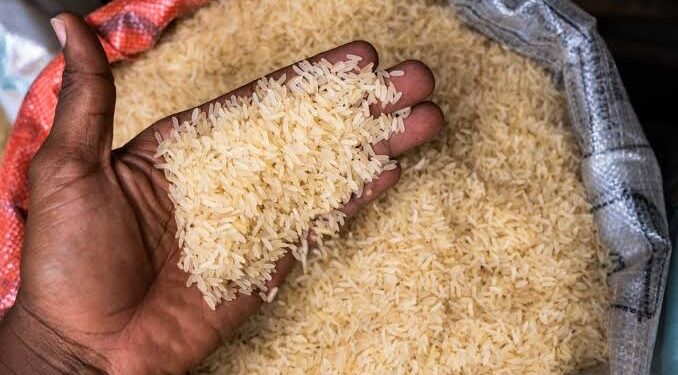Rice prices have dropped in Nigeria, heaving people in the West African country of a sigh of relief.
With the recent rebound of the naira against the dollar, the price of a 50-kilogram bag of rice has dropped to an average of N67,000 in Lagos, Abuja, Ogun, and others.
This development comes as a welcome change for families in Nigeria who were previously paying N88,000 for a 50kg bag of rice in February 2024 or before.
In communities close to the borders, Punch gathered that the staple was selling at a much lower rate compared to what was obtained in the cities.
For example, in Ogun border communities like Imeko, Idiroko, Oja-Odan, and others, a bag of rice was selling for around N49,000 or below.
According to Ms Mayowa Tosho, a bag of rice now sells for N42,000 at Saki, a border community in Oyo State.
Our correspondent gathered that the prices of foreign parboiled rice had dropped more than those of local brands.
According to Ms Mayowa Tosho, a bag of rice now sells for N42,000 at Saki, a border community in Oyo State.
Punch also gathered that the prices of foreign parboiled rice had dropped more than those of local brands.
The removal of subsidy on petrol and the floating of the naira in the middle of last year shot up the prices of food items, leading to high inflation.
As the dollar fell against the dollar, rice soared to as high as N90,000 in Lagos between February and March.
However, punch correspondents, who visited various markets across Lagos, Abuja, Ogun, and others, confirmed that the food items were on a downward trend.
Selected rice sellers in Agege and Oshodi markets said the price of rice had been reduced to between N65,000 and N63,000 compared to December 2023 and January 2024, when the staple was sold between N75,000 and N80,000.
The traders, who spoke with punch, noted that the long grain rice, which sold between N42,000 and N50,000 mid-last year, jumped to N80,000 in January, causing an outcry among consumers.
In Oshodi, Ogechukwu Amadi noted that she bought a bag of rice between N74,000 and N76,000 in December and sold it for N83,000 during the period.
According to Amadi, she now buys rice for around N60,000 and sells it for N63,000.
“Our purchase rate will always determine our selling price. In most cases, wholesalers usually add about N2,000 to their selling price, and this has caused non-uniformity in the prices traders sell in the market.
“In December, I was buying between N74,000 and N76,000. But I now sell for N65,000 and sometimes N62,000, depending on who sold the stock to me,” she stated.
Why Rice Prices Dropped
Fintech Telex observed that there are multiple factors responsible for the slash in the price of rice, one of which is the appreciation of Naira in the foreign exchange market.
“Most market activities in Nigeria are centered around the Dollar. The dollarization of the economy affects the prices of these goods. In one word, the reason is Dollars” said the President of Farmers Association, Kabir Ibrahim.
For the President of the Allied Farmers Association of Nigeria, Dr Austin Maduka, the slash in price can also be attributed to the increase in the number of players in the sector, particularly those who process rice in the country.
According to him, there are more players in the industry than before, who are processing rice as a result of the government incentives and support for local production and domestic farming.
“Many people are going into the business of rice processing now than ever before. I think if the government can continue to do more to support local farmers, especially in the production of food items, the prices will go down even further,” Maduka noted.
What you should know
Although rice prices have decreased, there is still apprehension regarding the possibility of a boom-and-bust situation occurring.
Given the high rate of inflation which stands at 33.2% as of March 2024 according to NBS, some believe the price may not be sustained if the inflation rate is not completely cut to a reasonable level.
The International Monetary Fund (IMF) predicted Nigeria’s inflation rate to drop to 26.3% in 2024, noting that the country’s economy will equally grow by 3.3% this year.
In addition, the Central Bank of Nigeria (CBN) increased the interest rate by 200 basis points to 24.75 percent, in a radical attempt to tackle inflation in the country.
But these factors are not enough to address issues such as insecurity, poor electricity supply, and ease of doing business, experts believe. They say the fiscal policy side must complement the work of the CBN.
“The price of rice may rise in the future if the dollar rate is not stable. For example, if you look at the purchase of equipment used in processing factories, you’ll realize that those machines are not assembled in Nigeria.
“Power is also a huge factor. When you don’t have light, you need to use generators, and that costs more because these are heavy machinery.
The Federal Government needs to do everything it can to mitigate against a possible boost and bust. I will say with constant supply of electricity, the prices will crash even more in the coming months,” Maduka added.
Backstory
In 2015, former President Muhammadu Buhari banned the importation of rice through the land borders.
The Federal Government, through the Nigeria Customs Service, said rice should only be imported through the seaports after the payment of all necessary duties.
In the same year, the Central Bank of Nigeria prohibited the importers of rice and 41 other items from accessing foreign exchange through the official window, to promote local production.
However, the ban on those items, including rice, was lifted by the apex bank in October. As a result, they can now access forex from the official market.
Since then, the prices of rice have continued to soar above the purchasing power of ordinary Nigerians.










